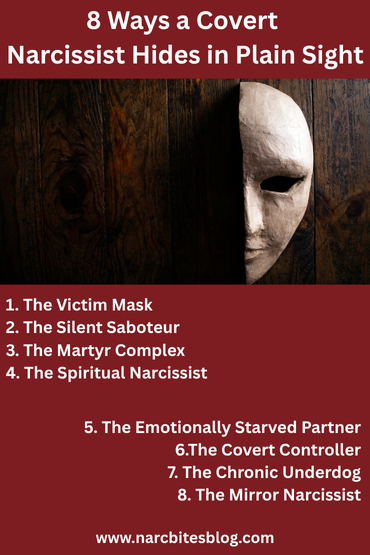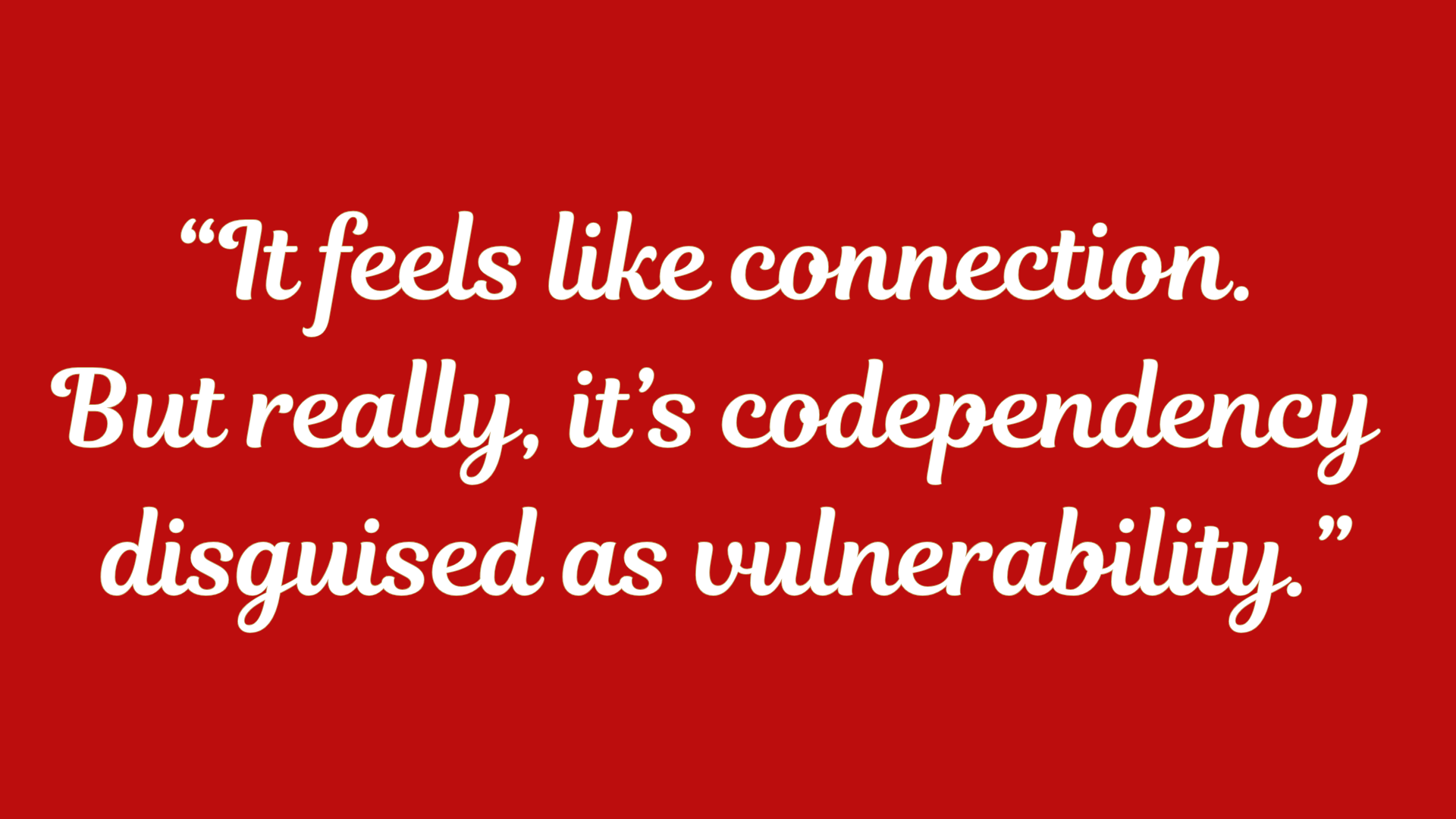When most people hear the word “narcissist,” they imagine someone loud, arrogant, attention-seeking, someone who dominates a room, brags endlessly, and demands the spotlight like it’s oxygen. That’s the classic image. The overt narcissist. Bold. Obvious. But not all narcissists look like this. The covert narcissist hides in plain sight.
But what if narcissism didn’t look like that at all?
What if it looked quiet, self-effacing, even fragile? What if the person who seems the most sensitive, misunderstood, or emotionally wounded… was actually a master of manipulation?
Have you ever met someone who made you feel endlessly guilty, constantly wrong, or mysteriously ashamed, even though they never yelled, never raised a hand, and never made a scene?
You might have been in the orbit of a covert narcissist.
This isn’t just a different flavor of narcissism, it’s an entirely different game. And if you’ve ever felt emotionally drained by someone who never raised their voice, always played the victim, and left you feeling like you were the problem… you might have met one, without even realizing it.
What Is Covert Narcissism?
Covert narcissism — sometimes called vulnerable or shy narcissism — is narcissistic personality disorder turned inward. The same deep sense of entitlement, need for admiration, and lack of empathy exists, but it’s expressed in subtle, passive-aggressive, and emotionally manipulative ways.
Instead of overt self-aggrandizement, covert narcissists present as:
- Highly sensitive
- Anxious or depressed
- Self-critical to the point of obsession
- Introspective or even spiritual
On the surface, they often appear humble or insecure. But beneath that is a familiar structure: an inflated sense of specialness, an inability to handle criticism, and a tendency to blame others for their emotional turmoil.
The covert narcissist doesn’t shout, “I’m better than you.” They sigh, “No one ever sees how special I am.”
How Does Covert Narcissism Develop?
While not every covert narcissist is formally diagnosed, their behavior tends to stem from a combination of early psychological wounds, personality structures, and survival strategies learned in childhood.
Many covert narcissists were once children who felt unseen, criticized, or emotionally neglected. Instead of receiving consistent love and validation, they were subtly dismissed, shamed for having needs, or rewarded only for being compliant or exceptional. As a result, they internalized a core belief: being myself isn’t enough.
To cope, they learned to present a version of themselves that seemed agreeable, sensitive, or high-achieving while secretly craving recognition, validation, and emotional dominance.
Unlike the overt narcissist who externalizes grandiosity, the covert narcissist turns it inward. They create an internal fantasy world where they are deeply special, misunderstood geniuses or unseen heroes and when the outer world doesn’t match this inner story, they experience shame, resentment, or depression.
This inner fracture — between how they feel and how they’re treated — becomes the breeding ground for manipulative behaviors. Rather than confront their pain or vulnerability, they control others into fulfilling emotional roles they feel entitled to.
In short, covert narcissism is often a survival mechanism: a way to feel powerful in a world that once rendered them emotionally powerless.
But survival mechanisms, when unchecked, can become destructive patterns especially in adult relationships where authenticity and accountability matter most.
1. The Victim Mask
One of the most recognizable faces of covert narcissism is the perpetual victim.
These individuals always seem to be suffering at the hands of their ex, their boss, their family, society. Everyone else is always hurting them, misunderstanding them, failing to meet their needs.
They weaponize pain. They use suffering as leverage. And if you care about them, you’re pulled into an endless cycle of emotional caretaking, always trying to heal wounds that never seem to close.
You’ll find yourself apologizing constantly, walking on eggshells, trying to avoid triggering their “sadness” when in reality, that sadness is used to control.
Their trauma is real, but it becomes currency. A transaction. You give, they take — wrapped in the illusion of connection.
2. The Silent Saboteur
Unlike the overt narcissist who bulldozes boundaries, the covert narcissist erodes them quietly.
They may not yell or threaten, but they undermine with subtlety:
- Backhanded compliments
- Passive-aggressive digs
- Disguised jealousy as concern
They might say, “I just want what’s best for you” but somehow, what’s best always involves you staying small.
Their manipulation isn’t explosive; it’s corrosive. It wears you down over time.
You start questioning your own goals, minimizing your accomplishments, and internalizing their quiet doubts as your own truth.
And the worst part? They often don’t seem like they’re doing it on purpose. Which makes you wonder if you’re the problem.
3. The Martyr Complex
Covert narcissists often see themselves as saints in a world of selfish people.
They’ll go out of their way to appear generous, helpful, or self-sacrificing but with a catch.
Their “generosity” comes with invisible strings:
- Expectation of praise
- Emotional debt
- Resentment if unacknowledged
They might give you a ride to the airport, then bring it up for the next six months. Not out of kindness, but because it reinforces their self-image as the long-suffering hero.
You never asked for the favor but somehow, you owe them.
You end up living in their moral universe. One where their sacrifices are endless, their pain is greater than yours, and their efforts are always unappreciated.
And guilt becomes your currency.
4. The Intellectual or Spiritual Narcissist
This face is particularly slippery because it wears the mask of insight.
These covert narcissists identify as deep thinkers, empaths, healers, or enlightened souls. They might be into psychology, astrology, mindfulness and on the surface, they speak a language of growth.
But dig deeper, and you’ll find:
- Condescension masked as advice
- A sense of superiority over “less awakened” people
- Emotional bypassing when confronted
They avoid accountability by framing everything as a lesson for you. If you call them out, you’re told you’re “projecting,” “not spiritually ready,” or “still in your ego.”
They create a hierarchy where they are always just a little more evolved than you.
And that gap? It’s where the control hides.
5. The Emotionally Starved Partner
In romantic relationships, covert narcissists often present as incredibly needy, misunderstood, or emotionally fragile.
They crave constant reassurance but give little in return. They need your empathy but dismiss your boundaries. They paint themselves as the underdog so convincingly that you feel guilty for even needing space.
They often use phrases like:
- “You’re the only one who gets me.”
- “Everyone else gives up on me.”
- “You’re so lucky I trust you with my darkness.”
It sounds intimate. It feels like connection. But really, it’s codependency disguised as vulnerability.
You become their emotional regulator, therapist, and lifeline all while your own needs fade to the background.
And the more you give, the more they take.
Until you forget what it feels like to receive.
6. The Covert Controller
This version doesn’t ask for power directly. Instead, they influence through withdrawal, sulking, or shame.
They control by making you uncomfortable:
- The long silences after you assert yourself
- The quiet punishments for doing something without them
- The way their energy shifts if you dare prioritize yourself
You feel it in your body before you understand it in your mind.
They don’t have to forbid you from anything. They just make you feel bad for wanting it.
And slowly, you start shrinking not because they asked you to, but because you’ve been trained to avoid disappointment.
7. The Chronic Underdog
They never seem to win. No matter what happens, life is always unfair to them. They didn’t get the promotion, their friends abandoned them, nobody supports their dreams.
At first, you feel empathy. You want to help. But then you notice:
- They never take responsibility
- They dismiss your wins with bitterness
- They demand cheerleading but offer none
Their underdog persona becomes a strategy to extract attention, sympathy, and loyalty.
And they’re always just one step away from thriving — if only you gave a little more.
8. The Mirror Narcissist
This one studies you. Your values, your style, your language. Then they reflect it back.
They seem to like all the same things. Believe the same ideas. Want the same future.
You feel seen. Understood. Matched.
But it’s not real connection — it’s replication. A facade. A carefully curated mirror designed to make you fall in love with your own reflection.
And when the mask slips, you’re not just heartbroken — you’re disoriented. Because you weren’t in love with them. You were in love with what they performed.
And that performance was never about you.
Covert Doesn’t Mean Harmless
Covert narcissism isn’t less dangerous than overt. It’s just less visible. Less questioned. Less obvious.
Which makes it more insidious.
The damage is real. The emotional erosion is slow, but devastating. And the healing? It takes time. Because when the harm wears a soft face, you end up blaming yourself for the bruises.




